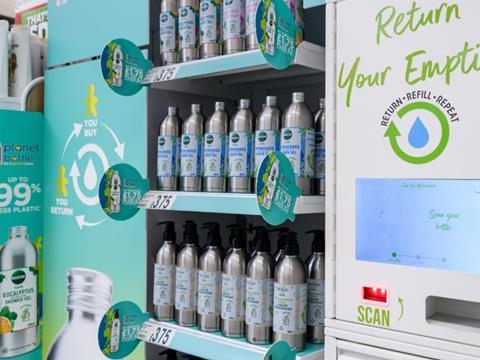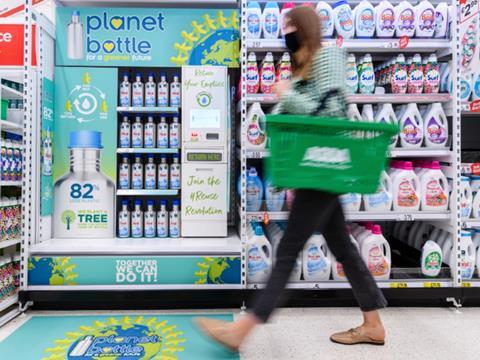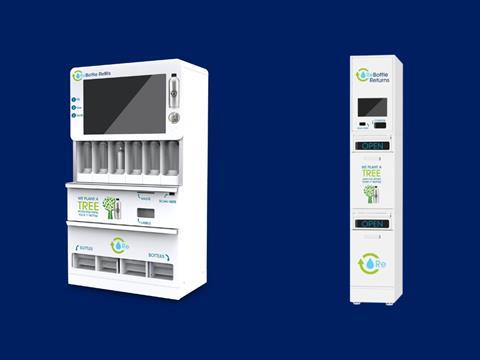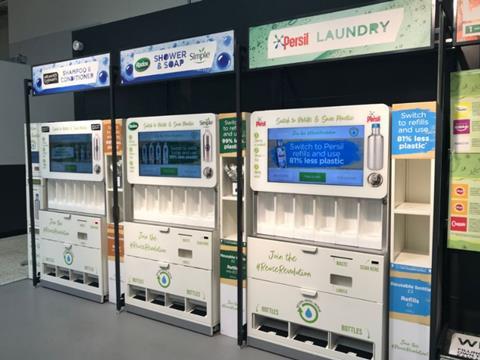
Re is a reuse model developed by Beauty Kitchen, a sustainability-orientated beauty brand founded by Jo-Anne and Stuart Chidley. The Re model focuses on replacing single-use plastic packaging for FMCG by offering brands and consumers universal reuse options that can be returned or refilled at stations in retail stores across the UK. Last month, Re was awarded Innovate UK funding as part of the Smart Sustainable Plastic Packaging Challenge.
We spoke to Jo-Anna Chidley, co-founder of Beauty Kitchen and Re, and Doug Morwood, managing director at Re, about how the scheme brings together key players from across the FMCG value chain in beginning to adopt consumer-facing circular economy frameworks.

Smart and sustainable packaging – as a service
Re conceptualises cost-effective packaging as a service with the aim of drawing both brands and consumers away from single-use plastic packaging for FMCG, and instead encouraging them to buy into the reuse model. For consumers, this means offering convenience and accessibility. For brands, Re is “dedicated to proving […] that refillable product models can be successful, scalable, and profitable”.
According to Morwood, “we must move beyond the linear system that results in so much waste, both in terms of materials and energy. To do this, we have to offer a compelling alternative to the current linear system that damages our environment so much. And that’s exactly what we’re doing with Re.”
One of the key components of the Re scheme is the Re Smart Bottles. “Every ReBottle is unique,” explains Morwood, referring to the network of smart technology embedded in each. Made from steel, glass, or next-generation washable plastics, Re Bottles feature a code on the base that can be scanned to provide lifecycle information – for example, when the bottle was last refiled and how many times it has been re-used – and for consumers to earn Rewards through their Re account.
Consumers can purchase Re Bottles pre-filled with their product of choice, for an additional fee of £2. This fee, however, works like a deposit return scheme: when the empty bottle is returned, the consumer receives a £2 coupon for their next Re Bottle purchase.
As an example, this would mean that when purchasing a shampoo with a recommended retail price of £5 in a Re Bottle, the consumer would pay £7 in total. When the consumer returns the Re Bottle, they can buy another product and the additional cost of the bottle purchase will be covered by the £2 coupon from the first sale and return. For future purchases, therefore, the bottle fee is repeatedly covered so long as the Re Bottle is returned, meaning consumers only pay for the contents of the bottle after the initial buy-in.
“We plant a certified tree for you when you Return or Refill for the first time, every 5th time and when you first join,” Chidley adds. “From the very first use you are saving plastic and when you refill or return you are already reducing your carbon emissions compared to an equivalent single-use plastic bottle.”
Re Smart Bottles (including the cap or pump) can be returned, by consumers, at Return Stations, with plans for these to be widely available in retail stores, shopping centres, universities, train stations, and major office complexes. At a Return Station, the consumer is asked to scan the unique QR code on the base of the Re Bottle, place it in the door of the machine, and then collect either a digital or printed coupon to cover their next purchase.
Re also offers Refill Stations, which the company explains are often next to Return Stations in stores. At Refill Stations, the Re Bottle can be refilled with the consumer’s product of choice; the machine is able to dispense any liquid into the bottles. These stations have interactive touchscreens and, at both Return and Refill Stations, consumers receive points for taking the Re Bottles back.
“The Refill Stations have been developed and manufactured in the UK and can be remanufactured to incorporate updated technology, eliminating future waste,” says Chidley. The manufacturing process is based on an exclusive agreement between Re and manufacturing technology provider RBC Group.
For Re Bottles at the end of their lifecycle, these can be sent back to Re either via a Return Station or Royal Mail Returns. The company will either reuse the bottle if possible or recycle it if not, such as in the case of damage. The Re Bottles can also be placed in household recycling.
The Re Bottles are suitable for a range of packaging applications, including laundry, home care, personal care, food, and beverages.

A collaborative effort
“Together with large and small retailers, as well as large and small brands, we can reduce plastic waste on a grand scale, and provide an unbeatable infrastructure for a circular economy through unprecedented business collaboration,” Morwood tells us. “Bringing businesses together to tackle the climate and waste crises is the only way we can solve the problem; collaboration is crucial.”
Brands working with Re include Beauty Kitchen itself, alongside Elemis, Unilever (covering its Persil, Radox, Simple, and Alberto Balsam brands), PZ Cussons (for its brands Original Source and Carex) and NAF! Salon. As for retailers, it has worked with ASDA, Co-op, M&S, Tesco, and Sainsbury’s.
Unilever was the second company to work with Re, launching three in-store Refill Stations at ASDA’s Sustainability Store in Middleton, Leeds, in 2020. Since then, the trial has been extended across the UK to include further ASDA supermarkets, as well as Tesco and Co-op stores. Refill Stations will be available to customers at ASDA shops in Middleton and Milton Keynes, and to Co-op customers in Marsh, while a range of other locations will offer the pre-filled bottles and Return Stations.
So far, in trials across 19 supermarkets, Re has reportedly achieved an 80% return/refill rate. As part of the Re scheme, the company claims to have saved over 4 million single-use bottles from landfill to date.
Alongside this, the consumer response appears to be positive. In research conducted alongside the pilot, 64% of consumers said they would switch retailer to use a refill station and 94% indicated they would shop more at a retailer that offered refill stations. As for the useability of the stations, 95% of consumers rated the Refill Station experience as “Good” or “Very Good”, while 96% agreed they would repurchase through the refill scheme.
Chidley says, “we are thrilled to see the highly successful results from the ongoing trials for Re; this is exactly what we were hoping for as so many of our efforts have been focused on over the past couple of years.
“All three of the key elements of the circular economy are buying into it. The consumers love it, the brands who use the reusable containers are very pleased, and the big retailers are all for it. This is how you make change and reduce waste.
“This is the future; a collaborative, circular economy that works for all parties. We are sharing this technology to co-operate with other brands, retailers, and corporations to accelerate an inclusive, scalable, and repeatable circular packaging solution.”
Re was also recently awarded £3 million of grant funding as part of the Smart Sustainable Plastic Packaging Challenge. According to Chidley: “This funding is exactly what Re needs to help refine and share the model with more brands, retailers and consumers. We are very pleased with the UKRI’s decision and look forward to seeing the impact of this grant funding right away.”
The funding coincides with Re’s partnership with City to Sea, which offers a Refill app that shows consumers where to find Refill Stations.

What’s next?
Re is actively looking for more partners. To companies looking to engage with a reuse/refill system, Chidley appeals: “Join us! This is an initiative for all brands in the cosmetics, beauty, and personal care industries. We will help you enter this ecosystem which will deliver real change that will benefit our environment.”
As for the data collected from the Re trials and the future scaling of the scheme, Morwood explains: “The Re team and I will be taking a data-led approach to this new system. We can harness data on a never-before-seen scale for these industries.
“Through this approach, we can drastically increase appetite from policy makers, funding bodies, consumers, brands across all industries, and retailers to rethink our linear systems and move towards circular models.
“Following this method, our goal is to smash the target of preventing 100 million bottles ending up in landfill over the next three years; with enough retailers and brands on board, we can empower consumers to help save far more than that, simply by making the whole process easy, convenient, and logical.”














No comments yet